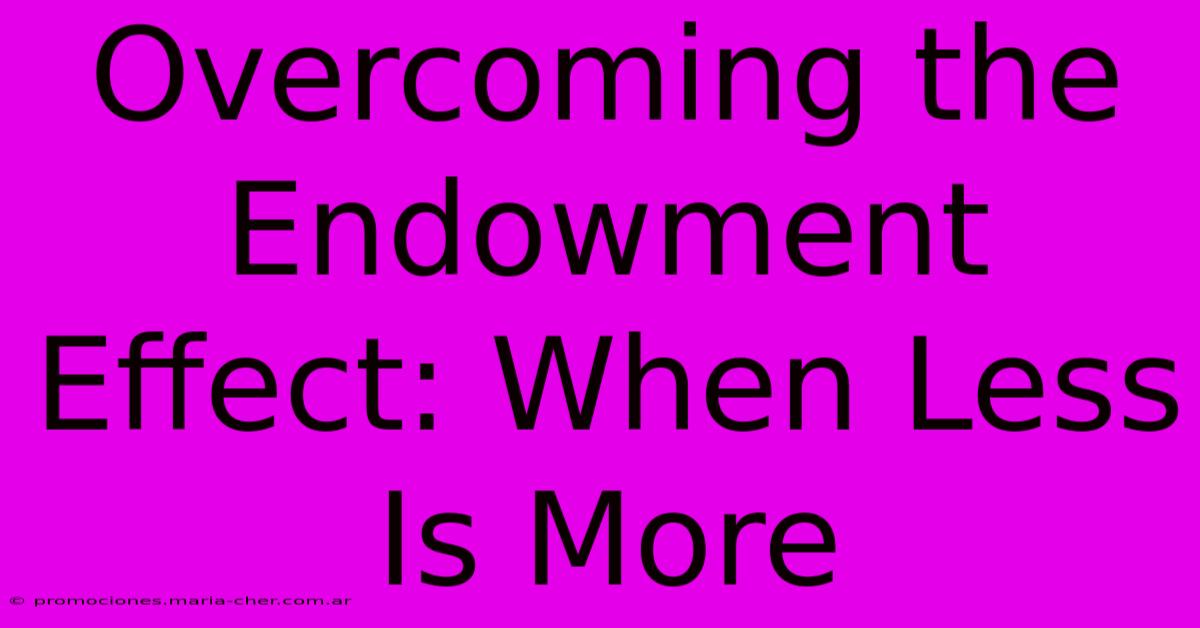Overcoming The Endowment Effect: When Less Is More

Table of Contents
Overcoming the Endowment Effect: When Less Is More
We've all been there. You buy a new gadget, excited about its features. A week later, you're already thinking about the next upgrade. Or perhaps you've haggled over the price of a used car, only to find yourself valuing it significantly more after you own it. This is the endowment effect in action – our tendency to place a higher value on things we own simply because we possess them. Understanding and overcoming this bias is crucial for making rational decisions, both in our personal and professional lives.
What is the Endowment Effect?
The endowment effect, a well-documented cognitive bias, describes the psychological phenomenon where we overvalue things we own or possess. This inflated valuation isn't necessarily based on the objective worth of the item, but rather on our subjective emotional attachment and sense of ownership. We tend to feel a loss more strongly than an equivalent gain, making us reluctant to part with something, even if a better opportunity presents itself.
Examples of the Endowment Effect in Daily Life:
- Selling a used car: You might ask for a much higher price than the market value because you've grown attached to your vehicle.
- Holding onto losing investments: Investors often hold onto underperforming stocks, hoping they'll recover, rather than cutting their losses and investing elsewhere.
- Negotiating a salary: You may overvalue your current position and salary, making it difficult to accept a potentially better offer elsewhere.
- Collecting items: The perceived value of collectibles often far exceeds their market price due to the emotional connection of the owner.
The Psychology Behind the Endowment Effect
The endowment effect stems from several psychological mechanisms:
- Loss aversion: The pain of losing something is often felt more strongly than the pleasure of gaining something of equal value. This inherent asymmetry influences our decision-making, making us reluctant to let go of what we already have.
- Cognitive dissonance: Selling something below our perceived value creates internal conflict (dissonance). To reduce this discomfort, we justify our higher valuation, reinforcing the endowment effect.
- Ownership and Identity: We often integrate our possessions into our sense of self. Parting with an item can feel like losing a part of ourselves.
Overcoming the Endowment Effect: Strategies for Better Decisions
While the endowment effect is a powerful bias, it's not insurmountable. By employing specific strategies, you can improve your decision-making and avoid its detrimental effects:
1. Detach Emotionally:
Try to view your possessions objectively, focusing on their actual market value rather than your emotional attachment. Imagine you're making the decision for a friend – would you give them the same advice?
2. Consider Opportunity Costs:
Weigh the potential benefits of letting go of something against the perceived loss. What could you gain by making a different choice? Often, the opportunity cost of holding onto something outweighs its sentimental value.
3. Reframe Your Thinking:
Instead of focusing on the loss of what you own, concentrate on the potential gains from a new opportunity. This reframing can shift your perspective and lead to more rational choices.
4. Seek External Perspectives:
Discuss your decisions with trusted friends, family, or professionals. An unbiased opinion can help you identify your emotional biases and make more objective judgments.
5. Practice Mindfulness:
Developing mindfulness can help you become more aware of your emotions and their influence on your decision-making process. This heightened self-awareness allows you to identify and counteract the endowment effect.
Conclusion: Embracing the Power of Less
The endowment effect, while a natural human tendency, can significantly hinder our ability to make rational and beneficial decisions. By understanding its underlying mechanisms and employing effective strategies, you can overcome this bias and unlock opportunities for greater personal and professional success. Remember, sometimes, letting go is the key to gaining something even better. The path to a more fulfilling life often involves embracing the power of "less is more."

Thank you for visiting our website wich cover about Overcoming The Endowment Effect: When Less Is More. We hope the information provided has been useful to you. Feel free to contact us if you have any questions or need further assistance. See you next time and dont miss to bookmark.
Featured Posts
-
Unraveling The Time Bending Enigma Is Time Truly Pinecone Shaped
Feb 07, 2025
-
Unveiling The Invisible The Baseline Mystery Revealed
Feb 07, 2025
-
The Dark Side Of The Bulls Unveiling The Sinister Symbolism Behind Its Upside Down Logo
Feb 07, 2025
-
Busting The Myths How To Spot And Avoid False Claims In Advertising
Feb 07, 2025
-
Mind Games And Marketing How The Endowment Effect Influences Consumer Choices
Feb 07, 2025
